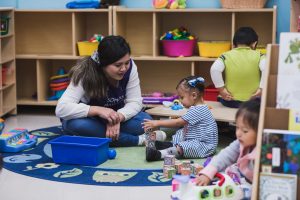summit
Early Childhood Philanthropy = Smart Funding + Racial and Social Justice + Women’s Rights + Children’s Rights

In philanthropy there’s no better place to begin than at the beginning.
Experienced philanthropists recognize the value of addressing problems early on, before they become intractable. Embracing upstream solutions and root causes is their credo. Many also place a premium on supporting foundational areas of work that radiate beyond a given silo, empowering people in multiple aspects of their lives.
Early childhood philanthropy fits the bill, in every respect.
If you’re an education funder, the earlier the better. In a child’s first three years, neural connections grow more rapidly than at any other time in life, establishing the foundation for communication, social skills, and thought- all prerequisites for learning and being in school.
Children denied access to quality early childhood education begin kindergarten with more ground to cover, and face an achievement gap that is likely to grow, a gap that may also exacerbate racial disparities, considering that children of color are more likely to attend under-resourced schools.
It doesn’t help that black children are suspended from preschool -yes preschool– twice as often as white children. Black boys who are physically bigger than their peers are especially at risk of being suspended or expelled, leading to what some call the “preschool to prison pipeline,” something our foundation and other early childhood philanthropists are working to disrupt.
Besides children, and their prospects for being better educated, healthier, and more lucratively employed as adults- all outcomes associated with high quality early childhood education, there’s another group that thrives when we invest in our youngest and suffers when we don’t: women.
In my home state, California, 60% of the population lives in “childcare deserts,” where there is simply no licensed childcare or preschool to be found. When available, it can be unaffordable, often costing more than college tuition, and the quality is uneven.
While women aren’t the only ones hurt by this predicament, the care and education of young children still generally falls on their shoulders. And because women typically earn less than men, they are the ones who more often leave their jobs when there are no affordable places for their children to be nurtured, thus perpetuating a cycle of lower wages and flatter career trajectories for women.
Early childhood educators themselves are overwhelmingly women, many of them immigrants and women of color. They are among the nation’s lowest paid professionals, sometimes earning less than dog walkers or fast food workers. More than half rely on some kind of government assistance, like food stamps, to survive. Turnover is understandably high, causing stress for children under their care.
Children deserve better. They deserve to be in places where they are greeted with smiles, there are books to read, blocks to stack, and room to run, and where their teachers know who they are and what they need to grow and learn- and aren’t distracted by worry about where their next meal is coming from.
The “good” news is that early childhood philanthropy is so underfunded that opportunities abound.
Funders can support policy and advocacy work for increased funding writ large, helping to fill a gap of $53 billion annually, the difference between a fully functional, high quality early childhood education program and what we have now, as conservatively estimated by the National Academy of Sciences. (This figure should not elicit sticker shock; the vast majority of other developed countries spend a higher percentage of their GDPs on early childhood education and care. See: https://www.oecd.org/els/soc/PF3_1_Public_spending_on_childcare_and_early_education.pdf.)
They can support the early childhood workforce, addressing enhanced preparation and compensation that allow educators to create emotionally and intellectually nurturing environments for children. Funding can bolster teacher development that addresses the growing diversity of our youngest learners, including dual language learners.
They can support work around data and governance so policy makers can know where young children are, what services they are getting or not getting, build evidence about what works, and have a streamlined infrastructure that delivers a continuum of vital services for our children and their families.
Even philanthropists who work in other areas can often do more impactful work by looking through an early childhood lens. For example, those who focus on housing can work to make sure childcare and education facilities are co-located within new housing developments in under-resourced communities, building oases in childcare deserts.
Some states, including California, have administrations that have embraced the evidence supporting the impact of early childhood education and are eager to engage philanthropy in public-private partnerships, opportunities we should seize.
Early childhood is fleeting and you can’t give back those years once they’re gone. We owe it to our children, their families, and those who care for them, to have their backs every step of the way.
